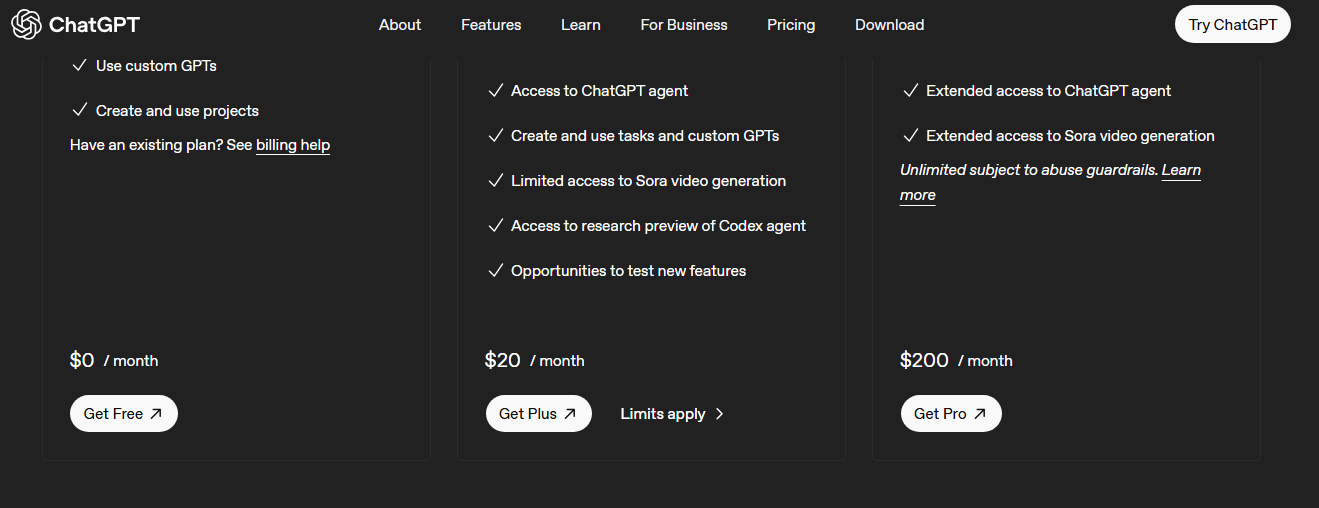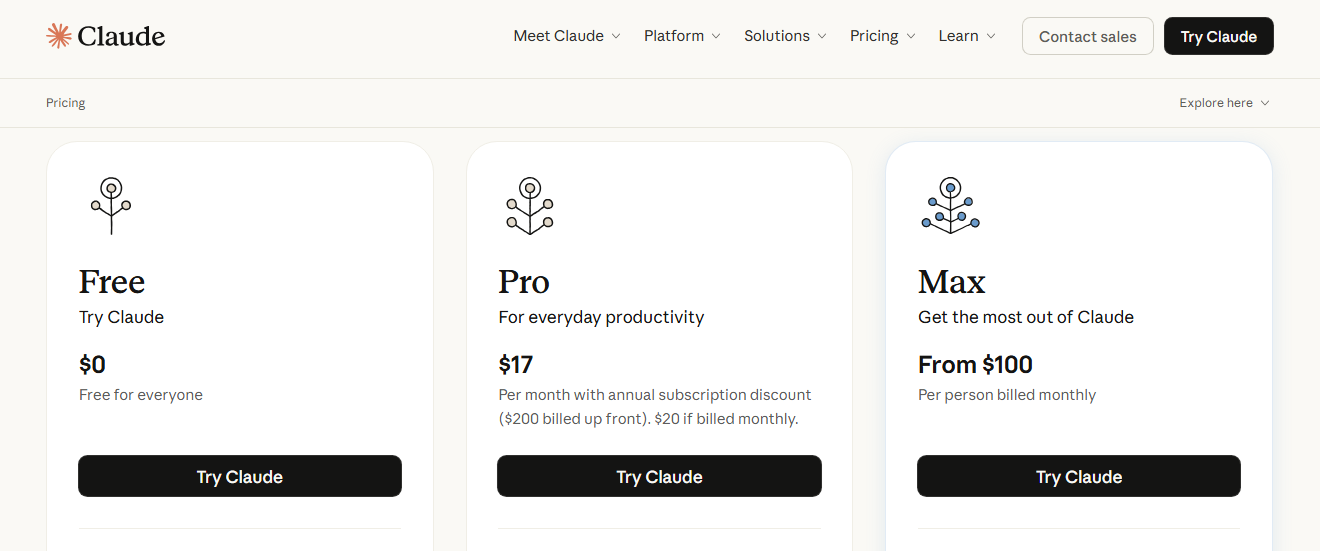AI subscriptions are getting expensive. Between ChatGPT Plus and Claude Pro, you could easily spend hundreds of dollars yearly on AI tools. But which one actually gives you the best for your money?
The truth is, both ChatGPT and Claude are powerful AI tools for writing, coding, and data processing. But they excel in different areas, and choosing the wrong one that suits your needs could waste your money or leave you frustrated.
In this article, we'll break down exactly what you get for your money with each platform. We'll compare pricing, features, and real-world performance to help you make the smartest choice for your budget and needs.
Before diving into the details, here's what you need to know about each platform:

ChatGPT, created by OpenAI, is currently powered by models like GPT-4o and the newer GPT-5 model. It's designed to be a versatile AI assistant that can handle everything from casual conversations to complex coding tasks.
The platform focuses on being user-friendly and offering multiple ways to interact - through text, voice, and images. OpenAI designed ChatGPT to be the ultimate all-in-one AI tool packed with plugins, web browsing, and integrations that make it versatile for nearly any task.

Claude, developed by Anthropic, takes a different approach. Claude is designed to be helpful. The current flagship model, Claude Opus 4.1, excels at thoughtful analysis, coding, and long-form context retention.
Claude shines when you need an AI that can understand context deeply and maintain consistency across long conversations. It's particularly strong for professionals who work with detailed documents, complex analysis, or need reliable, well-reasoned responses.
Looking at pure cost, Claude Pro offers 15% savings over ChatGPT Plus ($17 vs $20) for individuals. But the real value depends on your usage patterns:
- Best value for writers: Claude Pro gives you more usage allowance for long-form content, making it more cost-effective for content creators.
- Best value for developers: ChatGPT Plus real-time web access, but Claude Pro often better for programmers.
- Best value for businesses: Claude's enterprise features and longer context windows often provide better ROI for document-heavy workflows.
When evaluating AI tools for writing, the quality and consistency of output directly impacts your productivity and results.
Claude consistently produces more polished, thoughtful content. Its responses feel more natural and less "AI-like," which is crucial for professional writing. The platform offers built-in style controls, letting you maintain consistent tone across projects without constantly re-prompting.
ChatGPT excels at creative and varied writing styles. It's better for brainstorming, generating multiple versions of content, and adapting to specific brand voices when given detailed instructions. However, it sometimes requires more editing to achieve a professional tone.
So which does best at professional or creative writing?:
For professional writing Claude's consistency and thoughtful approach make it more reliable for business content, reports, and formal communications.
For creative writing ChatGPT's flexibility and creative capabilities make it better for marketing copy, social media content, and experimental writing.
This is where Claude shines. With 200,000 tokens of context memory compared to ChatGPT's 128,000, Claude can maintain coherence across much longer documents and conversations.
For practical writing tasks, this means:
- Claude can work with entire books or lengthy reports without losing track
- It maintains character consistency in long-form creative writing
- It remembers context from early in a conversation, even after thousands of words
ChatGPT's shorter memory is still adequate for most writing tasks, but you'll notice it "forgetting" earlier instructions in very long projects.
Both platforms can analyze uploaded documents, but they handle large files differently:
Claude processes lengthy PDFs and documents more effectively, maintaining understanding of the full context. This makes it superior for academic writing, legal document analysis, and comprehensive research projects.
ChatGPT handles a wider variety of file types and larger individual files (512MB vs 30MB), making it better for mixed media projects and technical documentation with embedded images.
For developers, the right AI tool can significantly impact productivity and code quality.
ChatGPT Plus offers developers a few useful extras. You can use the browsing tool to look up the latest docs or find fixes for new bugs without leaving the chat. The built-in Python tool lets you run code and test ideas right away. It works well with most programming languages, especially Python and JavaScript. And while third-party plugins are gone, Plus still includes handy tools like web search, data analysis, and image generation—all in one place.
Claude takes a different approach to coding assistance:
Claude Code is designed to integrate deeply into a developer’s terminal workflow. It can traverse large codebases, coordinate multi-file edits, and help refactor or document complex sections. Many users say it produces readable, structured code and can review pull requests with explanations of issues and improvement suggestions. Its deeper context capabilities help it maintain coherence across broader scopes than simpler snippet-based assistants. That said, its performance varies by project size, prompt quality, and compared model, and some users find its verbosity a tradeoff.
You should choose ChatGPT if you need real-time access to documentation and Stack Overflow, if you often work on rapid prototyping and experimentation, or if you want an environment that supports integrated testing and execution. It’s also a good fit if you prefer a more conversational coding partner.
On the other hand, Claude is a stronger option if you regularly work with large, complex codebases, need detailed code reviews and thorough documentation, or place a high value on clean, well-structured code output. It also shines for projects that require deep architectural understanding.
Both platforms offer enterprise-grade security, but with different strengths:
Claude Enterprise provides better privacy controls and longer context windows (up to 1M tokens), making it ideal for organizations processing sensitive documents.
ChatGPT Enterprise offers more integration options and collaborative features, better suited for teams that need to share and discuss data analysis results.
The advanced features often justify the subscription cost for specific use cases.
For chatGPT:
- Image generation (DALL-E 3): Create diagrams, illustrations, and other visuals directly within conversations.
- Voice mode: Speak to ChatGPT and receive spoken responses; available on supported devices and plans.
- Web browsing: Access up-to-date information, verify facts, and research recent developments through built-in internet search.
- Plugin ecosystem: Extend functionality with third-party integrations, connecting ChatGPT to external tools and services (availability varies by plan and region).
For Claude, you have:
- Artifacts: Create and edit documents, code, and structured content in a dedicated workspace. This makes Claude feel more like a professional writing environment.
- Extended Thinking mode: For complex tasks, Claude can use “Extended Thinking,” which lets it break down the problem more thoroughly, plan its reasoning steps, and provide more thoughtful answers.
- Long-form coherence: Claude’s models with Extended Thinking tend to maintain logical consistency across longer documents and more complex arguments, especially when given more context.
ChatGPT offers text, image, and audio input/output, making it ideal for multimedia projects, while Claude specializes in text and image analysis with exceptional quality; if you need broad multimedia capabilities, ChatGPT’s wider support may justify its higher cost, but for text-focused work, Claude’s precision often delivers better value.
After comparing features, performance, and pricing, here's how I will choose:
Multimedia capabilities: Image generation, voice interaction, and audio processing justify the higher cost if you use these features regularly.
Real-time information: Web browsing and current data access are valuable for research, journalism, or staying current with fast-changing fields.
Diverse workflows: The broader feature set and integrations make it cost-effective if you use it for many different tasks.
Team collaboration: Better sharing features and collaborative tools provide good value for team environments.
Professional writing: Superior writing quality and consistency make it more cost-effective for content creation and business communications.
Document analysis: Longer context windows and better comprehension provide excellent value for document-heavy workflows.
Code quality: If you prioritize clean, well-documented code over rapid prototyping, the lower cost and higher quality often provide better ROI.
Budget consciousness: The 15% cost savings add up, especially for individual users or small teams.
For power users, using both platforms strategically can be cost-effective:
- Use Claude Pro for writing and document analysis
- Use ChatGPT free tier for quick questions and image generation
- Total cost: $17/month instead of $20/month for full ChatGPT Plus
This approach works well if you can stay within ChatGPT's free tier limits for secondary tasks.
How Does Skynet Agent Studio Use chatGPT?
Skynet Agent Studio gives you a unified platform to build, orchestrate, and monetize AI agents using multiple services including OpenAI tool. Within Skynet, OpenAI is treated as an organizational service or tool, meaning you can plug it into any step of your agent’s workflow. Skynet makes it easy to assign the right tool for each task. Skynet handles the orchestration and tool integration behind the scenes, so your agents can seamlessly use OpenAI services alongside others in a single, coordinated workflow.
Both ChatGPT and Claude offer excellent value, but for different users and use cases. Claude Pro provides better value for most text-focused work at $17/month, while ChatGPT Plus justifies its $20 cost for users who need multimedia capabilities and real-time web access.
The key to getting your money's worth is choosing based on your primary use cases rather than trying to find a one-size-fits-all solution. Start with the free tiers of both platforms, identify your most important features, and then invest in the platform that best serves your core needs.
Remember, the best AI tool is the one you'll actually use consistently. Both platforms offer enough capability to transform your productivity - the question is which one fits better with how you work and what you're willing to pay for that transformation.
Which is cheaper: ChatGPT or Claude?
Claude Pro costs $17/month compared to ChatGPT Plus at $20/month for individuals, making Claude 15% cheaper. However, ChatGPT includes image generation and voice features that might eliminate the need for other subscriptions.
Is ChatGPT Plus worth the upgrade?
Yes, if you regularly hit the free tier limits or need web browsing, image generation, or voice features. The unlimited usage and priority access alone often justify the cost for regular users.
What's included in Claude Pro?
Claude Pro includes 5x more usage than the free tier, web search, Google Workspace integration, unlimited projects, and access to all Claude models including extended thinking capabilities.
Can I use both AI tools for writing effectively?
Yes, many users find value in using Claude for long-form content and professional writing, while using ChatGPT for creative projects and quick tasks. This can be more cost-effective than paying for the premium tier of both.
How do code tools compare between platforms?
ChatGPT offers better integrated development tools with code execution and web access, while Claude provides superior code review and documentation capabilities. Choose based on whether you prioritize testing/prototyping or code quality/analysis.
Which handles data processing better?
Claude excels at understanding complex documents and maintaining context across large files, while ChatGPT offers better visualization tools and handles larger file sizes. Your choice should depend on whether you prioritize comprehension or processing capacity.
Is Claude Opus worth the premium cost?
Claude Opus (available in higher-tier plans) provides the most advanced reasoning capabilities, but for most users, Claude 3.5 Sonnet in the Pro plan offers better value. Opus is worth considering only for complex analytical tasks requiring the highest level of AI reasoning.
What are the best free alternatives?
Both ChatGPT and Claude offer generous free tiers that may be sufficient for light usage. For alternatives, consider Google Gemini or Microsoft's Copilot, though they offer fewer features and capabilities than the paid versions of ChatGPT and Claude.
